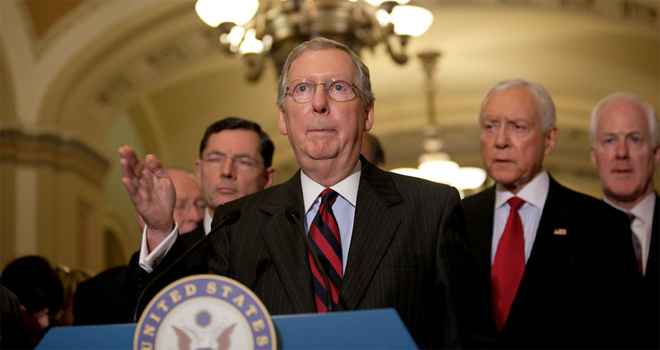Senate Minority Leader Mitch McConnell (R-KY) has proposed creating an escape hatch for Congressional Republicans, who have put themselves in a box by threatening not to raise the national debt limit if Democrats don’t agree to trillions of dollars in cuts to popular social programs.
[TPM SLIDESHOW: Meet The Leaders Of The Conservative Movement]
The plan is designed to give President Obama the power to raise the debt limit on his own through the end of his first term, but to force Democrats to take a series of votes on the debt limit in the months leading up to the election. This would stave off the threat of defaulting on national obligations, but keep the charged issues of debt and spending at the center of political debate for months.
The development confirms suspicions that the GOP was unwilling to truly use the looming debt ceiling as leverage to force conservative-friendly changes to popular entitlement programs, but suggests strongly that Republicans plan to continue politicking on fiscal issues through the 2012 elections.
In what he described as a “last-choice option,” McConnell proposed a method by which the country could avoid default if debt negotiations led by President Obama fail to produce a grand bargain on debt reduction in the days ahead.
“If we’re unable to come together, we think it’s extremely important that the country reassure the markets that default is not an option, and reassure Social Security recipients and families of military veterans that default is not an option,” McConnell said.
The plan would require Congress to pass a bill allowing Obama to raise the debt limit on his own, contingent on a series of steps: Obama would have to notify Congress of his intent tor raise the debt limit — a high-sign to Congress that would be subject to an official censure known as a “resolution of disapproval,” and which Obama could veto. If he vetoed the resolution, and if Congress sustained the veto, then Obama would also have to outline a series of hypothetical spending cuts he’d make, equal to the amount of new debt authority he’d give himself. Only then would the Treasury be allowed to issue new debt.
McConnell proposes rolling out this process in three tranches, to force Obama to request more borrowing authority, and to force debt limit votes in Congress, repeatedly through election season.
Here’s how McConnell explained it at his weekly Capitol press conference:
The way it would work is the legislation would authorize him to get to the amount he says he needs based upon the advice of his Secretary of the Treasury in three tranches: The first tranche, $700 billion, the second tranche $900 billion, the third tranche $900 billion.
Once the request is made it would be appropriate in either or both houses for a resolution of disapproval to be taken up on an expedited procedure. If that expedited procedure in both the House and the Senate — if the resolution of disapproval achieved a majority — it would go down to him where he could either sign it or veto it. My assumption is he would veto it. And that veto would be sustained by one-third-plus-one in either of the houses.
For a good analogy to the resolution of disapproval, read this.
The legislation would not give Obama unilateral authority to cut spending or reduce deficits. And as such, it represents a big policy cave by Republicans, who’ve long insisted that they would not raise the debt limit without enacting entitlement cuts long-sought by the conservative movement on a bipartisan basis. But, if Dems buy into this option, it will keep the potent debt issue alive, and central to politics, for much of this election season.
I asked McConnell if he’d cleared this backup plan with House Speaker John Boehner (R-OH). “I’ve spoken about it with others,” he said.
This is the first public blink by the GOP, and a fairly significant abdication of their leverage. But if this is indeed the route by which the debt limit will be raised, Senate Democrats and President Obama will have to support it. And so for they haven’t weighed in.
Asked about it at his press conference, just after McConnell’s, Senate Majority Leader Harry Reid (D-NV) was non-committal. “I’m not about to trash his proposal, it’s something I will look at, something I will look at intently,” Reid said. “He talked to me for just a few minutes. As some of you know, I’m not long on the telephone and neither is he, but I’m happy to take a look at it. I’d be happy to give his suggestion early consideration…. I’m only willing to take a look at Medicare, and Medicaid if there is a grand bargain, a grand bargain is one that is more than 4 trillion dollars and has significant revenue raisers.”






